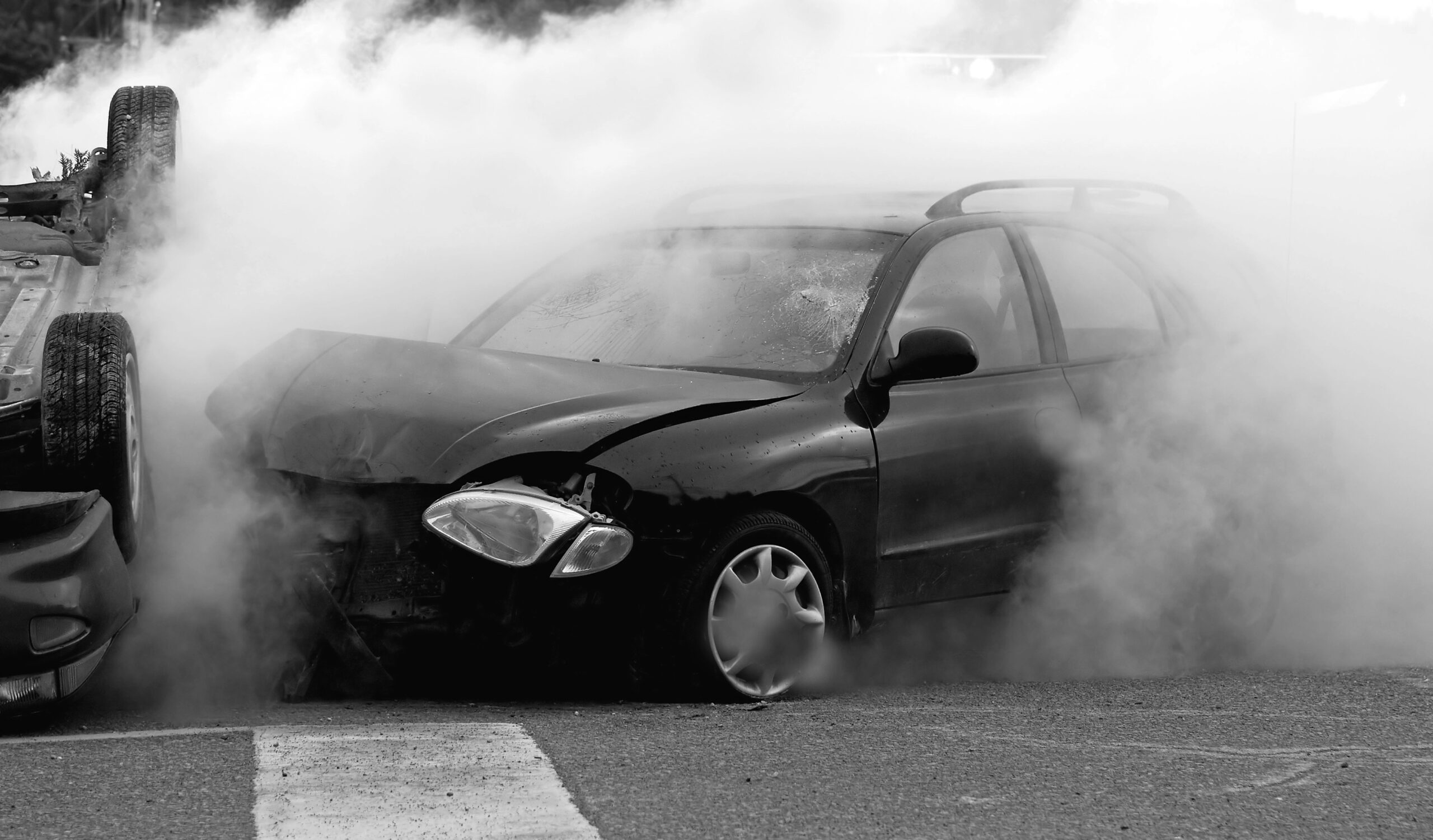Getting in a car accident is stressful, especially if you’re in an crash that totals your vehicle.
To help better understand your next steps, this guide goes over how your insurance company determines if your car is totaled, what your policy may cover, and how to prepare to negotiate a totaled car settlement.
What is a totaled car?
When car insurance providers declare a damaged vehicle is a totaled car or a total loss, it means the required repairs cost more than the car is worth.
If you’re in this situation, you could receive an insurance settlement that’s based on the pre-accident value of your vehicle—but it will depend on factors like state fault laws, the type of car accident, and your insurance coverage.
What type of insurance covers a totaled car?
Several insurance products provide a payout for total-loss vehicles, but different types of coverage apply to different scenarios. Here are the primary types of insurance you could use in the event of a total loss:
| Scenario | Applicable coverage | Applies if at-fault | Applies if not at fault |
|---|---|---|---|
| You collide with another vehicle or stationary object. | Collision coverage pays for any repairs and replacements resulting from a car accident. | Yes | Yes |
| Your car is stolen or damaged by vandalism or a weather-related event. | Comprehensive insurance covers damage to your car from theft, hitting an animal, falling objects, vandalism, riots, hail, floods, and other events outside of your control. | n/a | n/a |
| Your car is damaged in a hit-and-run, hit by an uninsured driver, or hit by a driver whose coverage limits aren’t high enough to cover the cost of replacing your car. | Uninsured motorist / Underinsured motorist property damage insurance (UMPD) fills the coverage gap left behind by an uninsured or underinsured driver. Keep in mind that UMPD isn’t available in all states and doesn’t cover hit-and-run accidents in others. | n/a | Yes |
| Your car is destroyed and the settlement falls short of the remaining balance on your car loan | Gap insurance is an add-on that pays the difference between the amount you owe on your car loan and the vehicle’s value after being totaled or stolen. | Yes | Yes |
| Your car is totaled and you want to replace it with a new vehicle. | New car replacement insurance pays for a new vehicle that’s the same make and model as your totaled car, not just the depreciated value. | Yes | Yes |
How do insurance companies decide if a car is totaled?
Auto insurance companies determine whether your vehicle costs more to fix than it’s worth, but they have to follow state guidelines while doing so.
Depending on your state of residence, there are two possible sets of rules when it comes to declaring a totaled car:
- Total Loss Formula (TLF): A vehicle is declared a total loss if the cost of its repairs plus salvage value equals or exceeds its pre-accident fair market value.
- Total Loss Threshold (TLT): A vehicle is declared a total loss if the cost of its repairs equals or exceeds a certain percentage of its pre-accident fair market value. State laws determine the percentage value, which can range from 60–100%.
Here’s a quick key to determining a totaled car in each state:
| Method used | States |
| Total Loss Formula (TLF) | AK, AZ, CA, CT, DE, GA, HI, ID, IL, ME, MA, MS, MT, NJ, NM, OH, PA, SD, UT, VT, WA |
| Total Loss Threshold (100% of the vehicle’s cash value) | CO, TX* |
| Total Loss Threshold (80%) | FL*, MN, MO, OR |
| Total Loss Threshold (75%) | AL, DC, KS, KY, LA, MD, MI, NE, NH, NY, NC, ND, RI, SC, TN, VA, WV, WY |
| Total Loss Threshold (70%) | AR, IN, IA, WI |
| Total Loss Threshold (65%) | NV |
| Total Loss Threshold (60%) | OK |
*Note that the TLT for Texas doesn’t include cost of materials and labor for repainting. In Florida, the TLT is 80% for an uninsured vehicle. However, an insured vehicle is considered a total loss when your insurer pays you to replace your car with a similar vehicle.
What to do after your car is totaled
1. File a claim
To report the accident, call your insurance agent as soon as possible with your insurance card in hand. Be prepared to provide details of the car accident, including the time, date, and any photos and notes you recorded. If necessary, you should also pass on contact details for your lending or leasing company.
After the car insurance claim is filed, your company will assign an insurance adjuster to your case. Once the question of fault is settled, your insurance provider will reach out with a settlement offer—but that doesn’t mean the amount of your settlement is necessarily set in stone.
2. Negotiate your settlement
If you’re planning to make a counteroffer, first do your homework. Here are some things that might support your argument for a higher reimbursement:
- A list of vehicle, trim, and package features drawn from the manufacturer’s sales brochures.
- A report or valuation from a private appraiser.
- Estimates of your vehicle’s value from sites like Edmunds or Kelley Blue Book.
- Receipts demonstrating regular maintenance or recent mechanical work.
- Sales listings for similar vehicles in your area.
If you and the insurance adjuster can’t agree on the vehicle’s actual cash value, you may need to contact your state’s Department of Insurance to review the case. However, if you’re happy with the full settlement offer, you can accept it. The insurance company will remove the totaled car and issue you a check.
Most states give insurers about 30 days to investigate car insurance claims, although laws vary. That’s why it’s important to read customer reviews to get an idea of how seamless your insurer’s claims handling process is before choosing an insurance company.
When you shop for car insurance with Jerry, you can read those customer reviews to help get a better sense of the company’s claims handling process.
3. Decide what to do with your totaled car
If your car insurance company approves the claim and you agree on a settlement, you can then inquire about keeping the car. Generally, the terms of a partial settlement include subtracting both your deductible (if you’re at fault) and your vehicle’s scrap value from the payout.
After that, what you do with your car is up to you. Here are a few ideas:
- Donate: Charitable organizations across the country use donated cars for parts or refurbishment. You can order a pickup, get a tax receipt, and contribute to a good cause all at the same time.
- Rebuild: Rebuilding a totaled car requires both a salvage title and, eventually, a rebuilt car title. It also requires a significant amount of time and money. Not only will you have to pay for the cost of repairs, but you’ll probably also pay higher-than-average rates to insure a rebuilt car.
- Sell: You may be able to sell your car for cash to a private buyer, as scrap, or to a junkyard.
FAQ
-
What do insurance companies do with totaled cars?
-
Can you repair a totaled car?
-
Does a total loss affect your credit score?
-
How is actual cash value calculated?

Kayda Norman is an insurance writer and editor with more than 12 years of content experience. She previously worked at NerdWallet as an insurance writer and content management specialist. She has covered a wide range of insurance topics such as high-risk drivers, auto insurance rate factors, and credit-based insurance scores. Her work has been featured in The New York Times, The Washington Post, and USA Today.

Everett Cook is an award-winning journalist and editor with more than 10 years of experience across a variety of industries. In editing for Jerry, Everett’s mission is to help readers have a better understanding of the costs of owning or leasing a car and to better understand their vehicle in terms of insurance and repairs. Prior to joining Jerry, Everett was an editor for Axios. His previous work has been featured in The New York Times, The Los Angeles Times, The San Francisco Chronicle, The Atlantic, Atlantic Re:think, The Boston Globe, USA Today, and others. He’s also been a freelance writer and editor with experience in SEO, audience building, and long-term content roadmaps. Everett is a proud graduate of the University of Michigan.









